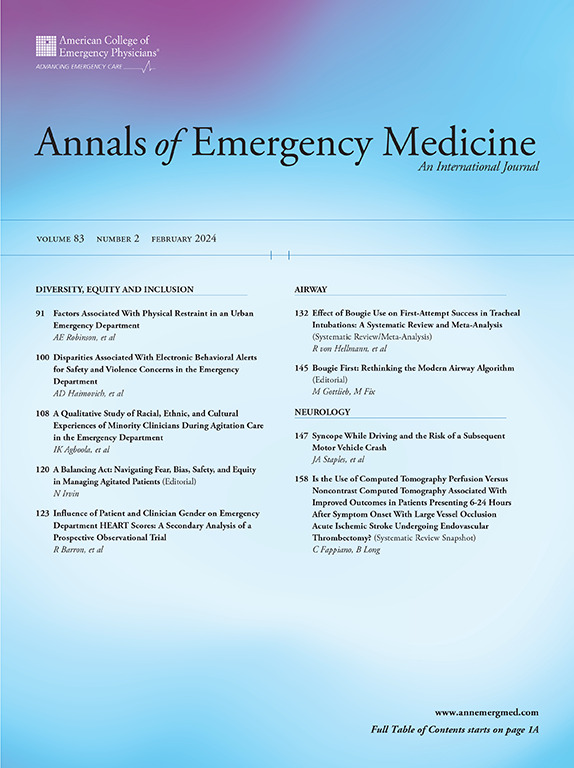Psychedelic Trips: Travel Within the United States to Use Psychedelic Drugs After Legalization.
IF 5
1区 医学
Q1 EMERGENCY MEDICINE
引用次数: 0
Abstract
STUDY OBJECTIVE Oregon and Colorado have legalized possession of natural psychedelic drugs. We assessed if travel to use psychedelics in decriminalized states is occurring and compared the use patterns of travelers with nontravelers. METHODS The National Survey Investigating Hallucinogen Trends is a cross-sectional behavioral survey fielded from April to June 2024 to every US state. The survey asks whether individuals used a psychedelic drug in the last 12 months and whether they traveled outside of their home state to do so. RESULTS A total of 2,124 people indicated use of psychedelic drugs in the preceding 12 months; 32.3% (n=687) traveled to take psychedelic drugs to at least one place; 13.9% (n=295) traveled to Colorado, 9.4% (n=199) traveled to Oregon, and 12.5% (n=265) traveled outside the United States. Travelers, compared with nontravelers, were more likely to have current anxiety or depression symptoms and were more likely to have attributed an emergency department or urgent care visit in the past 12 months to psychedelic drug use. Travelers were more likely to treat medical symptoms (23.4% versus 17.5%), use in psychedelic/healing centers (38.9% versus 11.9%), and at a ceremonial site (43.1% versus 13.0%) compared with nontravelers. CONCLUSION Those traveling to use psychedelics were more likely to treat a mental health disorder and have a psychedelic attributable emergency department visit than nontravelers. Emergency physicians in legalized and nonlegal states must be aware that travel to use psychedelic drugs is common because risks of adverse outcomes while traveling and returning home may accompany travel to use.迷幻之旅:在美国境内使用迷幻药物合法化后的旅行。
研究目的俄勒冈州和科罗拉多州已经将天然致幻剂合法化。我们评估了在非犯罪化的州是否正在发生使用迷幻药的旅行,并比较了旅行者和非旅行者的使用模式。方法全国迷幻药趋势调查是一项横断面行为调查,于2024年4月至6月在美国各州进行。该调查询问个人是否在过去12个月里使用过迷幻药,以及他们是否曾出过州使用迷幻药。结果在过去12个月内,共有2124人使用过致幻剂;32.3% (n=687)至少到过一个地方服用迷幻药;13.9% (n=295)前往科罗拉多州,9.4% (n=199)前往俄勒冈州,12.5% (n=265)前往美国境外。与非旅行者相比,旅行者目前更有可能出现焦虑或抑郁症状,并且更有可能将过去12个月的急诊科或紧急护理就诊归因于使用迷幻药。与非旅行者相比,旅行者更有可能治疗医学症状(23.4%对17.5%),更有可能在迷幻/治疗中心使用(38.9%对11.9%),更有可能在仪式场所使用(43.1%对13.0%)。结论:与非旅行者相比,使用致幻剂的旅行者更有可能治疗精神健康障碍,并有致幻剂导致的急诊就诊。在合法和不合法的国家,急诊医生必须意识到,旅行使用致幻剂是很常见的,因为旅行和回家时可能会伴随使用致幻剂的旅行产生不良后果的风险。
本文章由计算机程序翻译,如有差异,请以英文原文为准。
求助全文
约1分钟内获得全文
求助全文
来源期刊

Annals of emergency medicine
医学-急救医学
CiteScore
8.30
自引率
4.80%
发文量
819
审稿时长
20 days
期刊介绍:
Annals of Emergency Medicine, the official journal of the American College of Emergency Physicians, is an international, peer-reviewed journal dedicated to improving the quality of care by publishing the highest quality science for emergency medicine and related medical specialties. Annals publishes original research, clinical reports, opinion, and educational information related to the practice, teaching, and research of emergency medicine. In addition to general emergency medicine topics, Annals regularly publishes articles on out-of-hospital emergency medical services, pediatric emergency medicine, injury and disease prevention, health policy and ethics, disaster management, toxicology, and related topics.
 求助内容:
求助内容: 应助结果提醒方式:
应助结果提醒方式:


